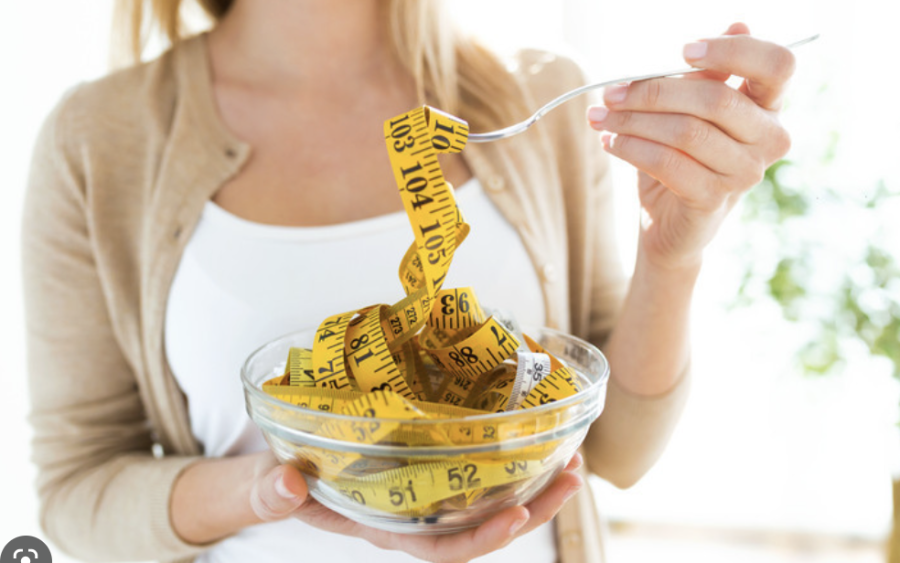Dieting: The Silent Poison
April 28, 2023
The students who were interviewed for this article chose to be anonymous, as this is a very sensitive topic.
I am a fifteen year old girl in modern day society, and already, a myriad of different industries target my insecurities to sell me placebo products. Already, I am a victim of the diet industry. Already, I think twice about what I eat. I carefully analyze the ingredients on my Cheerios in the morning. Guilt gnaws at my stomach after a chocolate square
after dinner. When I go on social media, I am bombarded with edited pictures of beautiful women—but they don’t say that they’re edited. Not to mention, anytime I try to watch a video on YouTube, I’m attacked by ads for diet products.
I know I shouldn’t look up my BMI. I know I shouldn’t look at the calories in a banana; but I do it anyway. I do it because, like almost every other girl I know, society has taught me that girls should be pretty (though I shouldn’t be too confident), quiet (but interesting—no one wants a boring girl), and thin (but not too thin). We should have perfect teeth, perfect hair, perfect outfits, a perfect smile. It is this idea of perfection that whispers in our ears and tells us to starve ourselves in silence. Perfection suffocates us. As Voltaire said, “Perfect is the enemy of the good.” While obesity has become an epidemic, children and teens should not diet due to the fact that it leads to unhealthy eating habits that will continue in adulthood if not addressed.
And I’m not alone.
The diet industry makes billions of dollars off of women’s insecurities—insecurities created by society’s ideas of perfection. According to Boston Medical Center, about 45 million Americans contribute to the $33 billion spent on weight loss products by going on a diet. This is concerning; the diet industry is called an industry because it markets products and methods that don’t always work. Rather, they work rapidly, have temporary successful results, and permanently damage people’s relationships with food. The South Carolina Department of Mental health asserts that the death rate from anorexia nervosa for women ages 15 to 24 is 12 times higher than the annual death rate from all other causes, combined. The $37 billion diet industry is a loud one, throwing advertisements everytime you go on a social media site. But it can also be quiet—and that is when it is most deadly. It murmurs beauty standards in every TV show, in hired social media influencers. It is filled with nutritional misinformation, false and ‘predatory’ advertisements, and more, thus making it harrowing for children (and adults!) to navigate. We cannot expect children and teenagers to understand this complicated world where so many different people contradict one another.
An anonymous student at Harrison High School explained how social media shapes the way she views herself. “I try not to indulge in media a lot because even when it’s not directly about body issues, I sometimes see videos about eating less calories or sugar or trying a certain diet that I personally think are putting too much focus on what’s in something, rather than how it makes your body feel or what it allows it to do.”
The Keto, Paleo, Dukan, HCG, Zone, intermittent fasting, and the Atkins diets are just some of the many different diets that exist. There are a multitude of diets out there, but not all are actually healthy. Fad diets get results fast but oftentimes leave the individual with an eating disorder. Others have no effects at all. Our bodies are all so very different, consequently it is unrealistic to believe that a diet that works for one person will work the same for another. Instead, nurturing a healthy relationship with food, regardless of weight, is what truly matters. It is what is best for a child, regardless of weight, according to Dr. Yoni Freedhoff, an associate professor of family medicine at the University of Ottawa. It is true that obese children and teens are more likely to grow up as obese adults, but that is no excuse to force a diet upon them, one that may not work and will only further wreck their body image and relationship with food.
“The establishment clings to the belief that weight causes disease and death just as people once insisted that the world was flat,” stated Dr. Wooley of the University of Cincinnati to the New York Times. “There are no studies proving that weight causes disease; the predilection to certain diseases could well cause the extra weight.”
Obesity may be an epidemic, but so are eating disorders like anorexia and bulimia. Instead of focusing on children and having them diet, studies show that helping parents with their relationship with food may further help the child. This is because children tend to model their parent’s behaviors.
“I think I have learned both healthy and unhealthy eating habits from my parents,” said another anonymous student. “The idea of waiting until the meal time – even if it’s in an hour and a half – to eat even though I’m really hungry isn’t a form of healthy eating and that is definitely something that my parents imprinted on me. My parents—more so my mom—were also the parents who, when I said I was really hungry, would say to just eat a handful of almonds.”
Furthermore, children shouldn’t diet because the diet industry encourages counting calories. Weight gain occurs if an individual consumes more calories than they burn, which is why restricting caloric intake is a main focus of many diets. Yet, studies conducted by the National Institute of Health reveal that restive eating leads to further weight loss struggles, and impoverishes one’s relationship with food. Additionally, restring foods and ignoring one’s hunger signals can cause a bing, restrict, repeat cycle. This can also express itself in a binge eating disorder. This is a recurring idea: the diet industry tells people that they need to change themselves, and pushes them to drastically distort their body. But dieting only leaves people isolated, tired, and most of all, befuddled. We can’t ask children to understand the complex marketing strategies and algorithms of the diet industry unless we wish them to grow up with an eating disorder.
“If I could speak to my younger self,” stated a sophomore student at Harrison High School, “I would tell her to do her best to not compare her unique body to the bodies of others. I never have to earn my food. I would tell her that there are better and healthier ways to adjust my eating habits than to just stop eating, and to never learn about calorie deficits.”
Obesity may be a major issue, but so are eating disorders. Children and teens should not be encouraged to diet because it permanently affects eating habits. It is likely to stain their perception of themselves and poison their relationship with food. No parent should wish that for a child. Instead, parents should focus on nurturing healthy eating habits, disproving false claims from the food industry, and teach them how to properly listen to their bodies’ needs. Before living in America, my family and I lived in Europe. It’s thanks to those prior experiences that I was able to notice America’s heightened desire for perfection. It’s almost as if perfection is attainable here; people strive for perfect teeth, enduring years of braces and dentist appointments, then living with a retainer for even longer. What is wrong is not the want for beautiful white teeth, but it’s the denial that teeth move and no one will ever have a perfect jaw—not for very long, at least. This is just like how our body changes over time, and our weight is constantly fluctuating. Diet culture tells us to always try to be ‘our best self,’ or to be in ‘our best body,’ conveniently forgetting to remind us that today’s body standard is unattainable naturally. We should want a healthier body for ourselves, not for society, and understand that there is no set ‘healthy’ weight. ‘Healthy’ is self-love, moving your body because it makes you feel better, not to burn calories. It takes years for many adults to understand this; in a society obsessed with perfection, children and teens must understand the difference between health and aesthetic, between health recommendations and the diet industry.
Photo from Harvard Health








![[From left to right-Top row: Harison Fliegenspan, Talia Russo, Isis Leite, Micaela Thone, Rosella Paniccia. Bottom row: Maya Rolan, Eren Yoshimura, Audrey Cheung, Karinah Diaz]](https://thehuskyherald.org/wp-content/uploads/2025/02/IMG_0927.jpg)














